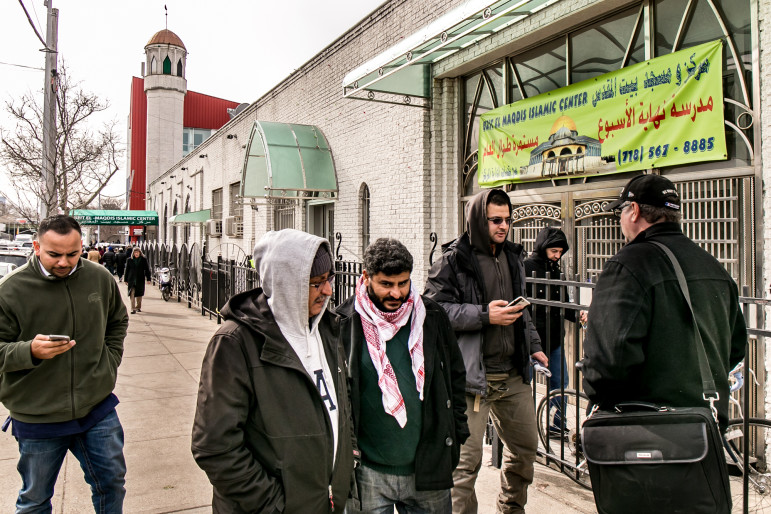
Adi Talwar
On a recent Friday, men leave the Beit El-Maqdis Islamic Center. The Center is in Sunset Park, just north of Bay Ridge, a neighborhood with a heavy Arab presence where Syrians might be relocated if they came to New York City in any numbers.
In September 2015 when President Obama made the controversial decision to call for 10,000 Syrian refugees to be resettled in the United States in 2016, Mayor de Blasio was quick to jump into the fray. Shortly after the announcement, de Blasio was one of 18 mayors to sign a petition encouraging Obama to accept even more refugees.
When anti-refugee rhetoric exploded in wake of the Paris attacks, de Blasio reiterated his commitment to keeping New York City open to Syrians while attacking conservatives like Donald Trump for Islamophobic statements.
Despite de Blasio’s outspoken stance, New York City has not had the chance to welcome many Syrian refugees yet. Political gridlock and unparalleled levels of security screenings for applicants means Syrians have been slow to arrive in the country at all. Many wait over two years for approval. Even so, the prospect of more refugees arriving has advocates urging local and state officials to take a hard look at existing infrastructure for refugees. Aber Kawas, Youth Organizer at the Arab American Association of New York, says the thought of thousands more Syrians arriving in the U.S. keeps her up at night.
“We’re not ready, honestly,” says Kawas, “The refugees need more than a check and an apartment when they arrive. They need community support.” Kelly Agnew-Barajas, director of refugee resettlement at Catholic Charities of the Archdiocese of New York, says that the monetary support allotted for refugees is “breathtakingly low” and leaves refugees scrambling from the get-go. Currently, the federal government grants a one-time stipend of $1,125 per refugee, with the possibility of public assistance thereafter. After years of displacement—and paying the exorbitant fees necessary to secure safe passage out of Syria— many refugees are in dire financial straits by the time they arrive in the U.S. “Many are so worried about getting an income,” says Agnew-Barajas, “they don’t take time to learn English or get integrated. This makes things harder in the long run.”
Stipends and grants are primarily the jurisdiction of the federal government, but de Blasio’s office says it is doing its part to improve social services for refugees, in particular by strengthening communication between local government and the grassroots. Commissioner Nisha Agarwal of the Mayor’s Office of Immigrant Affairs told City Limits: “The United States has a long-standing tradition of welcoming refugees, and the de Blasio administration is committed to preserving that tradition.” In addition, a city official says MOIA is “meeting with New York City refugee resettlement agencies to determine how the City can help connect refugees to City services and resources.”
Agnew-Barajas, who joined other non-profit and government leaders in Albany on Monday for a quarterly meeting on issues of immigrant and refugee affairs, says de Blasio’s administration has been responsive to their concerns. “You get the feeling that executive leadership is very invested in helping refugees get the support that they need.” Agnew-Barajas says the Mayor’s Office of Immigration Affairs has helped in responding to individual cases, although she admits, “there’s still a lot of inefficiency in the general bureaucracy.”
Susan Donovan, International Rescue Committee‘s Interim Director of Programs for New York and New Jersey, says that while the mayor’s office has been proactive in offering support, “the nation’s system is in need of an overhaul.” As Agnew-Barajas points out, “most of the procedures in place date back to the Vietnam era.” Since then, few reforms have been made to streamline or update the process. Rather, says Agnew-Barajas, “politicians have just added regulation on top of regulation,” leaving a “very, very long pipeline” for refugees.
Anthony Farmer of the state Office of Disabilities and Temporary Assistance says New York welcomed approximately 4,000 refugees during the 2015 fiscal year. So far, fewer than 3,000 Syrians have arrived in the country on refugee status, but New York City is already serving as a hub for families on their way to their permanent locations. New York City is also home to thousands of immigrants of Arab origin, including many like the Ferdous family cited by Mayor de Blasio, who fled to the United States on temporary visas and later received Temporary Protected Status. In New York City, new arrivals face a unique balance of opportunities and challenges. “Obviously, the cost of living in New York is a definite downside,” says Donovan, “but on the other hand, in a city as diverse as New York, there are lots of employment opportunities.”
Education for refugee children is another critical factor, and it’s one where grassroots organizers have been able to make a difference. “We really targeted language access in public schools,” says Kawas, who celebrated alongside other immigrant advocates when Chancellor Carmen Fariña announced the expansion of translation services in public schools this January. “This was a huge victory,” says Kawas of the program that will allow non-English-speaking parents to become more involved in their child’s education.
But change is needed inside the classroom, too, says Rana Shanawani, a Syrian-American businesswoman who has organized ad-hoc English classes in her hometown of Elizabeth, New Jersey. “Many of these kids have missed four years of school due to the war,” explains Shanawani, “But this isn’t taken into consideration when they’re placed in classrooms.” As a solution, she has helped facilitate meetings between parents, volunteer advocates, and translators to negotiate increased support for students who are struggling. “Some problems are easy to solve,” says Shanawani, who has seen students go from failing to passing with a few adjustments in their curriculum, “but the parents don’t always have the ability to advocate for their children.”
All of this takes an emotional toll, too. Donovan says the IRC recognizes that the psychological effects of the refugee experience deserve attention. While Donovan admits “the United States tends to overlook mental healthcare in general,” she mentions a few support groups in the city, facilitated by IRC social workers. “It’s something, at least,” she says. Shanawani says she also hopes that, as material needs are met, agencies will be able to shift more attention to mental health.
As these debates continue, the question of larger-scale resettlement looms. Talk of regional and national-level organizing on this issue has been circulating among New York City activists since fall 2015. In October, representatives from the IRC, the AAANY, Islamic Relief, and local communities met in Manhattan to discuss collaboration. “We want to be proactive,” Sarab al-Jijakli, a prominent NYC-based activist, said at the meeting. “We want to connect, pool our resources, and prepare, so that we have a functioning network of support as more refugees arrive.”
In the meantime, Syrians already in the area are learning the ropes. One family of eight who arrived in Elizabeth, New Jersey ten months ago, celebrates each of their gradual steps towards a more normal existence: the father found temporary work, the family recently bought a car, and their sixteen-year-old son hopes to take summer classes to make up for time lost during his two and a half years as a refugee in Turkey. He was a young child when he set his heart on becoming a doctor–and he was only twelve when war broke out in his hometown of Idlib. “When we left home, I thought my dream was over,” he told me, his voice low but faintly hopeful, “Now, we’re here, and people are telling me that in America, I have a second chance.”


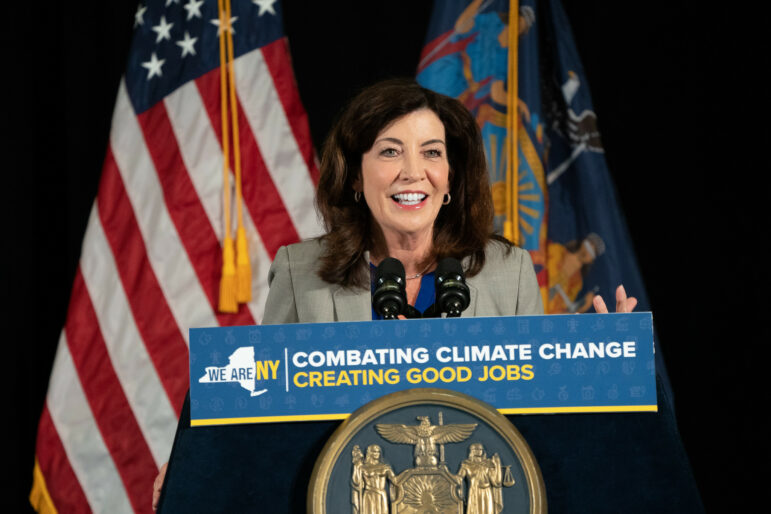

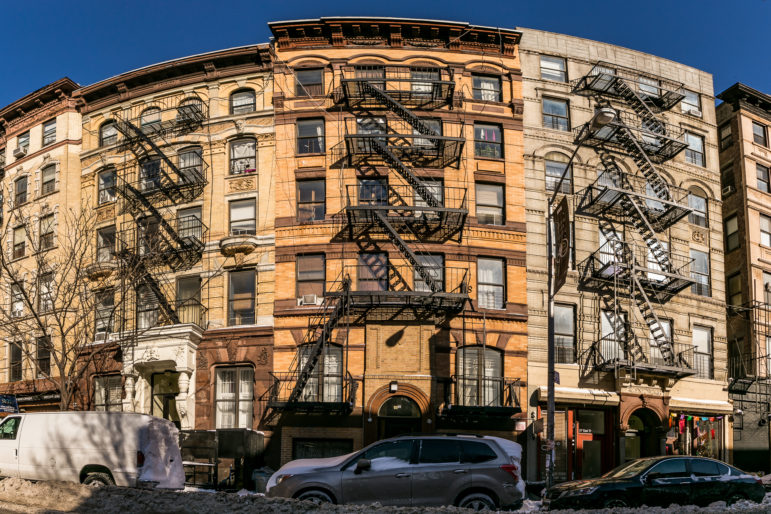
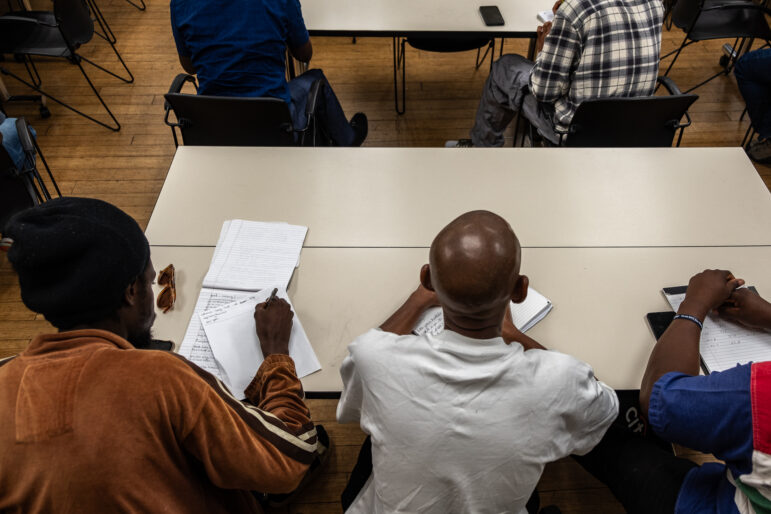
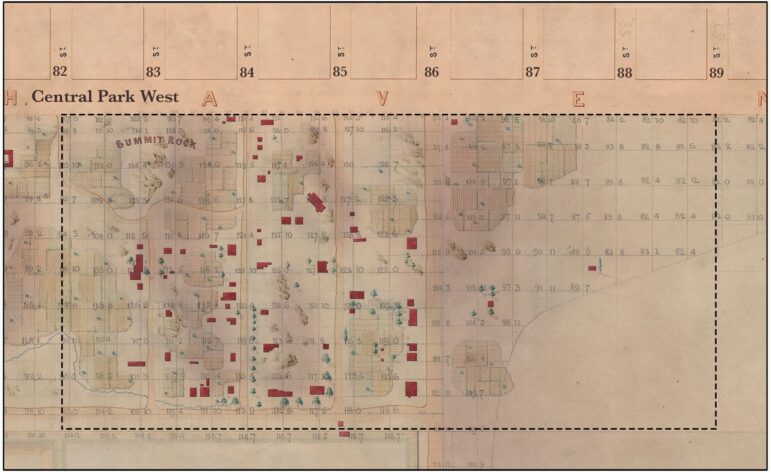


6 thoughts on “Is New York City Ready for Syrian Refugees?”
We don’t need them. We have our own that need to be taken care of. They cannot be a Muslim and take in western values. This country doesn’t need any more leeches. Obama you turn your back on your people and accept these Islamic [people]. Have you ever heard of “thighing”? our children and women will no longer be safe. Rape is normal marriage to a 9 year old girl is ok. They are waging jihad against the world. I mean let’s be real just how hard is it to turn a moderate Muslim into a jihad Muslim. Hmm let’s ask San Bernardino!
Jason my brother. Im sorry for you ,because as a Christian all have a duty to help all people who are in need , no matter race ,religion,color and thats what Jesus would want us to do..and by your way of talking it shows, you were never thought respect and care for those in need and very ignorant ..you must be one of those people who follow fox news or other news channels who just portray hate and misguided information to put America against Muslims.. don’t judge all the same without you even been in their country or met any of them..ive travelled to many Muslim countries and no problem at all because I show my respect and Christian values that they appreciate and they say ..you been brought up the right way..and there’s alot Muslim countries which are very open and not all are wearing hijab to cover all face..think before you talk ..and people like you let down our country ..we need help those in need like many Americans are already welcoming Syrian families in their home and giving them the life they deserve ..God bless them
They will cause nothing but trouble in NYC and in the US. Ask the people of France what an increasing muslim population does to a country.
I for one have no problem accepting refugees in my community. I do understand the need for planning this out however, these people need or help. Together, hopefully, we can only improve our communities.
We have a homeless/shelter problem that the delinquent mayor hasn’t fixed..we don’t need anymore refugees or illegal immigrants when we have our legal immigrants and veterans on the streets.On the news they had a homeless African American girl with lung cancer homeless..Meanwhile we got Muslim men in the projects taking up 3 or more apartments because the men have like 3 or more wives with a whole bunch of kids that basically take up a whole floor with their whole family..
For the record, refugees are legal immigrants. Also for the record, NYCHA requires that at least one member of an applicant household be a United States citizen or a non-citizen with eligible immigration status (e.g Permanent Resident, Refugee/Asylum statuses). In the absence of any proof, we’ll leave aside the specifics of your accusation about Muslim men in public housing. But logically, whether it’s a result of polygamy, as you suggest, or unwed serial monogamy, or divorce and remarriage, if three separate sets of mothers and children exist, it doesn’t seem unusual to expect that they would occupy three separate apartments wherever they’re living. I’m not sure what the alternative would be.